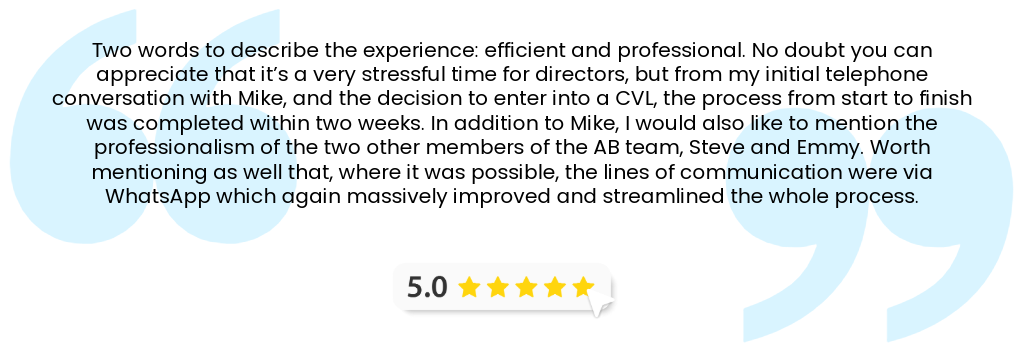
In this article we discuss the requirements to notify creditors when striking off a company. This guidance will ensure you stay compliance and take the right route with your business. At Anderson Brookes we are debt specialists and licensed insolvency practitioners.
Quick Facts: Notifying Creditors About a Company Strike Off
- Identify all creditors and compile a list
- Draft a formal letter informing creditors of the strike-off intention
- Include company name, registration number, and reason for strike-off
- Settle outstanding debts or agree on a repayment plan before sending notifications
- Send notifications via recorded delivery and allow time for objections
- Maintain communication records and address queries promptly
- File DS01 form with Companies House after notifying creditors
- Monitor the process and address any issues that arise
Table of Contents
Why Informing Creditors Is Critical
Notifying creditors about a company strike off is a key step with significant legal and financial implications – so you want to get it right! Proper communication protects your interests and helps maintain professional relationships.
Legal Obligations
You have a legal duty to inform creditors when initiating a company strike off. This requirement stems from the Companies Act 2006, which mandates transparency in the dissolution process. Failing to notify creditors can lead to serious consequences, including the suspension of the strike off application.
To comply, you must send a formal letter to all known creditors within 7 days of submitting the strike off application to Companies House. This letter should clearly state your intention to strike off the company and provide details about any outstanding debts.
If your company’s assets are valued at over £25,000, you may need to consider liquidation instead of a strike off. In such cases, it’s wise to seek professional advice to ensure you follow the correct procedure.
Consequences of Non-Compliance
Ignoring your obligation to inform creditors can have severe repercussions. Creditors have the right to object to the strike off if they’re owed money. If you fail to notify them, they may discover the strike off notice in the Gazette and raise objections, leading to:
- Suspension of the strike off process
- Potential legal action against you or the company
- Damage to your professional reputation
Moreover, HMRC must be informed of the strike off. Failure to do so can result in penalties and complications with tax liabilities. To avoid these issues:
- Settle all outstanding debts before applying for strike off
- Keep detailed records of all communications with creditors
- Ensure all tax obligations are met and HMRC is properly notified
By fulfilling your legal duties, you protect yourself from future claims and maintain ethical business practices.
Contact us online or call 0800 1804 935 to speak to an expert today.
Preparing Notifications
Notifying creditors about a company strike off requires careful preparation and attention to detail. Proper communication ensures transparency and helps manage potential objections to the process.
Drafting A Notice Letter
Begin by crafting a clear and concise letter to each creditor. Include the company’s full registered name, number, and address. State the intention to strike off the company and provide the specific reasons for this decision.
Explain the implications of the strike off for outstanding debts. Be transparent about the company’s financial situation and any assets available for settlement.
Include the proposed timeline for the strike off process. Mention the two-month objection period following the publication in The Gazette. Provide contact details for creditors to submit queries or objections.
Required Documentation
Gather all relevant financial records to support your notice. This includes recent bank statements, balance sheets, and profit and loss accounts. These documents help demonstrate the company’s financial position.
Prepare a list of all known creditors and their contact details. Ensure this list is up-to-date and comprehensive.
Include copies of any relevant correspondence with HMRC or Companies House regarding the strike off application. This helps establish the legitimacy of the process.
If applicable, prepare documentation showing attempts to settle debts or negotiate with creditors. This demonstrates good faith efforts to address outstanding liabilities.
Methods of Communication
Notifying creditors about a company strike off requires clear and effective communication. There are several proven methods to ensure all relevant parties receive proper notice.
Letters vs. Emails
Letters remain a formal and reliable way to inform creditors of a company strike off. They provide a physical record and can be sent via registered post for proof of delivery. Include key details like the company name, registration number, and strike off timeline.
Emails offer a quicker, more cost-effective option. They allow for easy tracking and immediate delivery. Use professional language and request read receipts. Ensure you have up-to-date email addresses for all creditors.
Both methods should clearly state the company’s intention to strike off, explain the reasons, and provide contact information for queries. Consider using a template to maintain consistency across all communications.
Using The Gazette For Public Notification
The Gazette, the UK’s official public record, is a tool for notifying creditors of a company strike off. Companies House publishes strike off notices in The Gazette as part of the legal process.
You must place a notice in The Gazette at least three months before applying for strike off. This public announcement gives creditors and other interested parties time to object if necessary.
The notice should include:
- Company name and number
- Directors’ names
- Registered office address
- Intention to strike off
- Deadline for objections
While The Gazette fulfils legal requirements, it shouldn’t replace direct communication with known creditors. Use it as a supplementary method to ensure comprehensive notification.
Unsure How To Communicate With Creditors? Let Us Help
Communicating with creditors can feel daunting, but it’s important you that you:
- Start by being proactive.
- Reach out to your creditors as soon as possible to discuss your financial situation.
- Honesty is key in these conversations.
Be transparent about your company’s challenges. Explain the reasons behind the potential strike off and your current financial position. This openness can help build trust with your creditors.
When speaking with creditors, remain calm and professional. Prepare key information beforehand, such as:
- Your company’s financial statements
- A list of assets and liabilities
- Any proposed payment plans or solutions
Listen carefully to your creditors’ concerns and be open to negotiation. They may be willing to work out alternative payment arrangements or settlements.
Consider seeking professional advice if you’re unsure how to proceed. An insolvency practitioner or financial advisor can provide valuable guidance on communicating with creditors effectively.
Remember, creditors often prefer to recover some funds rather than none at all. By approaching the situation proactively and honestly, you increase your chances of reaching a mutually beneficial agreement.
Handling Creditor Objections: A Strategic Approach

When notifying creditors about a company strike off, you should be prepared for the possibility of objections. How you address these objections can significantly impact whether your dissolution proceeds smoothly or becomes protracted and potentially costly.
Understanding Why Creditors Object
Creditors object to company strike offs for various reasons, with unpaid debts naturally being the most common. However, objections may also arise due to ongoing contractual obligations that your company is attempting to exit, or disputes over amounts owed. Even when you believe a debt is invalid or the amount is incorrect, a creditor may still object until the matter is resolved.
Legal proceedings present another common ground for objection. If a creditor has initiated legal action or is contemplating doing so, they’re likely to object to preserve their right to pursue claims. Similarly, HMRC might object if they’re reviewing your company’s affairs or suspect undeclared liabilities.
Effective Response Strategies
Rather than waiting for formal objections to be lodged with Companies House, it’s generally advantageous to engage with potential objectors early in the process. Personal contact with major creditors before sending formal notifications can open dialogue about outstanding issues and potential resolutions. These conversations should be carefully documented, as they may prove valuable later.
Where creditors have valid claims, you might want to consider whether a settlement could be appropriate. The specifics will depend entirely on your unique circumstances, but ensuring any agreements reached are properly documented is always prudent. In particularly complex situations, independent mediation might be worth considering to help reach a mutually acceptable resolution.
Disputed claims require careful handling. Gathering all relevant documentation that supports your position is essential, as is considering whether alternative dispute resolution methods might be appropriate. In some cases, seeking legal advice on the strength of your position may be necessary before deciding how to proceed.
If you’re facing significant creditor objections, it might be worth reflecting on whether a strike off is truly the most appropriate path forward. Companies with unpaid creditors may need to consider formal insolvency procedures instead. Each situation is unique and requires an individual assessment to determine the most suitable solution. The key is to evaluate your company’s financial position realistically when mapping out next steps.
Important Considerations
When managing creditor relationships during a strike off, it’s worth remembering that all creditors, regardless of the size of their claim, have the right to object. Focusing solely on major creditors whilst neglecting smaller ones can lead to unexpected complications.
Keeping thorough records of all communications with creditors is tremendously valuable. Should questions arise later, having documentation of your correspondence can help clarify what was discussed and agreed upon.
The objection period following publication in The Gazette lasts for two months, and this timeframe should be factored into your planning. Directors should also be mindful of their duties regarding company assets throughout the dissolution process. The inappropriate distribution of assets prior to completing all necessary steps could potentially have implications for directors.
Professional Support
There are certainly situations where professional assistance becomes particularly valuable. These might include scenarios with multiple creditors threatening objections, disputes involving complex legal or contractual issues, negotiations that have reached an impasse, or cases where tax authorities are involved.
At Anderson Brookes, our licensed Insolvency Practitioners can provide guidance on the available options when facing creditor concerns during the strike off process. We can assist in evaluating your specific circumstances and discussing appropriate courses of action.
Addressing creditor concerns properly is an important part of the company dissolution process and can help protect directors from potential future complications. With careful planning and the right approach, even challenging creditor situations can often be navigated successfully.

Frequently Asked Questions
How can one inform HMRC when applying for a company strike off?
When applying for a company strike off, you must inform HMRC by submitting final tax returns and accounts. Ensure all outstanding tax liabilities are settled before proceeding. Contact HMRC directly to confirm your intentions and request confirmation that there are no outstanding issues.
What steps should be taken to notify creditors before striking off a company?
Before striking off a company, you must notify all known creditors in writing. Provide clear information about your intention to strike off the company and the timeline for this process. Allow creditors sufficient time to raise any objections or settle outstanding accounts.
What are the legal ramifications for directors following a company strike-off?
Directors may face personal liability for company debts if proper procedures are not followed during the strike-off process. Failure to inform creditors or settle outstanding debts can result in legal action against directors personally. Ensure all legal obligations are met to avoid potential consequences.
How does a compulsory strike-off differ from a voluntary strike-off?
A voluntary strike-off is initiated by the company directors, while a compulsory strike-off is initiated by Companies House. Compulsory strike-offs often occur when a company fails to file required documents or respond to official communications. Voluntary strike-offs offer more control over the process.
What are the implications of having a company struck off without settling debts with creditors?
Striking off a company without settling debts can lead to serious consequences. Creditors may apply to have the company restored to the register to pursue their claims. Directors could face personal liability for unpaid debts and potential legal action from creditors or authorities.
What should a company do upon receiving the first Gazette notice for strike off?
Upon receiving the first Gazette notice, review the information carefully. If you wish to proceed with the strike-off, ensure all requirements have been met. If you need to stop the process, file the necessary objections or update any outstanding information with Companies House promptly.
